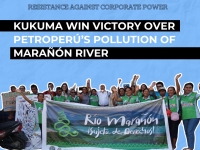Kukuma Win Victory Over Petroperú’s Pollution of Marañón River

Spills from Petroperú’s oil drilling have devastated the Marañón river in Peru for some 50 years. In order to tackle the pollution, a group of Kukama Indigenous women sued the government and Petroperú asserting that the river is a living entity with rights that should be protected. In March 2024, a court ruled in favor of the plaintiffs and ordered the company to clean up the river.
“The recognition made in this decision is one more opportunity to keep fighting and claiming our rights. Our work is fundamental for Peru and the world: to protect our rivers, territories, our own lives, and all of humanity, and the living beings of Mother Nature.” – Mariluz Canaquiri Murayari, president of Huaynakana Kamatahuara Kana. (Federation of Kukama Indigenous Women)
Oil Drilling
Companies like Frontera Energy, Occidental, Petroperú, and Pluspetrol began oil drilling in the Marañón region in the 1970s. The crude oil is transported by Petroperú’s 1,106 kilometer-long onshore Norperuano oil pipeline which often breaks, polluting local rivers with arsenic and mercury. As a result, locals have reported migraines, vomiting, stomach pain, skin rashes, and miscarriages among pregnant women.
Kukuma
The Kukuma and the Urarina are among the Indigenous Peoples who live on the banks of the Marañón. They use the river for bathing, fishing, and transportation, and they consider it to be a living being and a source of spiritual and practical knowledge.
Activism
In 2001, Kukama women from over 28 communities set up a federation named Huaynakana Kamatahuara Kana to protect the river. Flor de Maria Paraná, a Kukuma leader from Cuninico village, testified on the pollution to the Inter-American Commission on Human Rights. Other activists documented how Petroperú regularly pays local men to clean up the river and force them to sign an agreement to keep quiet.
Protests
In the last few years, Kukuma protestors have regularly blockaded the river, barring Petroperú workers from leaving well sites in an effort to raise their concerns and ask for redress. In November 2022, a group of local activists briefly detained a group of 70 French, Spanish, and Swiss citizens who were sailing down the Cuninco tributary of the Marañón river in order to draw attention to the issue.
Lawsuit
In 2021, Huaynakana Kamatahuara Kana sued several Peruvian government agencies and Petroperú in 2021. To argue their cause, they drew on other cases in Canada, Colombia, and New Zealand where the rights of rivers and Indigenous stewardship were upheld. They also argued that the destruction of the river amounted to a violation of their religious and cultural freedoms.
Victory
On March 15, 2024, a court in Loreto province of Peru ruled that the Marañón River has “intrinsic value” and must be protected. It also ruled that the Kukama and other Indigenous communities are the rightful guardians of the river and have the authority to represent it. This is the first time a Peruvian court has recognized the rights of nature and required that they be safeguarded.
Company Response
“Given the alert issued by leaders of indigenous organizations of the Cuninico native community, located in the district of Urarinas, in Loreto, about the alleged presence of hydrocarbon residues in the river of the same name, the Environmental Assessment and Enforcement Agency carried out supervision and according to its results, it is ruled out that such an event is occurring.”
Company Statement
This is #87 in our series of Instagram infographics on resistance against corporate power.
Click here to see the full post on Instagram.



